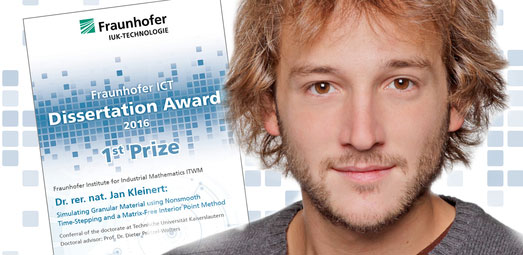Scientific achievements and the further qualification of employees are the core responsibility of the individual Fraunhofer institutes. The Fraunhofer ICT Group supports these goals by awarding internal prizes for outstanding publications and theses at the Fraunhofer Institutes.
ICT Dissertation Award
Since 2015, the Fraunhofer ICT Group has presented the annual Fraunhofer ICT Dissertation Award. Here, the jury awards outstanding dissertations from the Fraunhofer institutes that deal with highly innovative developments and technologies in computer science, mathematics or related fields. The prize is endowed with 5,000 euros, 3,000 euros and 2,000 euros for the first three places.
2025 award winners
The winners of the Fraunhofer ICT Dissertation Award 2025 are setting new standards in applied research: Lena Cibulski from the Fraunhofer Institute for Computer Graphics Research IGD is working on visual analytics approaches in her dissertation that improve data-based decisions by intelligently linking large-scale results with subjective preferences. Iñigo Cortés Vidal from the Fraunhofer Institute for Integrated Circuits IIS explains in his work how adaptive control algorithms increase the robustness of satellite-based navigation systems in dynamic and noisy environments. Friedrich Wagner, also from Fraunhofer IIS, takes hybrid quantum-classical optimization to a productive level. By combining classical integer methods with quantum algorithms, larger problem sizes can be solved more efficiently, complemented by advances in quantum algorithm compilation and error reduction. The work impressively demonstrates how interdisciplinary approaches, applied methods, and close industry cooperation increase the performance of research results in science and practice.

1st prize
Fraunhofer IGD – Lena Cibulski
The Fraunhofer ICT Group recognizes the outstanding scientific work of Lena Cibulski and its significant contribution to the research field.
In her dissertation “Visual Analysis for Multi-Attribute Choice”, she presents novel approaches to support complex data-driven decision-making. The work addresses how analytical insights from large data sets can be meaningfully combined with the subjective preferences of decision-makers. Based on applied field research and close collaboration with domain experts, the dissertation introduces new concepts for real-world decision processes and translates them into innovative visual analytics tools. The results demonstrate how visualization can substantially improve the quality, transparency, and robustness of expert decisions in practice.

2nd prize
Fraunhofer IIS – Iñigo Cortés Vidal
With this award, the Fraunhofer ICT Group highlights the exceptional quality and relevance of the dissertation by Iñigo Cortés Vidal at Fraunhofer IIS.
In his dissertation “Generalized Robust Adaptive Control Algorithm for GNSS Receivers”, Iñigo Cortés Vidal presents adaptive control algorithms that significantly improve the robustness of GNSS receivers in dynamic and noisy environments. The work focuses on adaptive synchronization techniques that enable reliable position, velocity, and time estimation under challenging conditions. The results demonstrate how adaptive signal processing can enhance the performance and resilience of modern navigation systems, providing valuable contributions to GNSS technologies with strong practical relevance.

3rd prize
Fraunhofer IIS – Friedrich Wagner
The Fraunhofer ICT Group warmly congratulates Friedrich Wagner and Fraunhofer IIS on this distinction within the Fraunhofer ICT Dissertation Award 2025.
In his dissertation “Integer Optimization for Quantum Computing”, Friedrich Wagner explores how classical integer optimization techniques can be combined with quantum algorithms to address practically relevant optimization problems. The focus lies on hybrid quantum-classical approaches that allow significantly larger problem instances to be solved even on today’s limited quantum hardware. In addition, the work contributes advanced methods for compiling quantum algorithms and mitigating hardware-induced noise. The results highlight the strong potential of hybrid optimization methods for the future practical use of quantum computing.
2024 award winners
The award-winning dissertations of 2024 focus on innovative deep learning approaches – ranging from medical image analysis to the examination of complex image data and the optimization of 3D printing processes. The jury, chaired by Prof. Stefan Decker (Fraunhofer FIT) and including Prof. Claudia Eckert (Fraunhofer AISEC) and Prof. Joachim Bös (Fraunhofer IDMT), recognized outstanding scientific achievements that each make a significant contribution to applied research. The winning dissertations come from the Fraunhofer Institutes for Digital Medicine MEVIS, for Industrial Mathematics ITWM, and for Computer Graphics Research IGD.
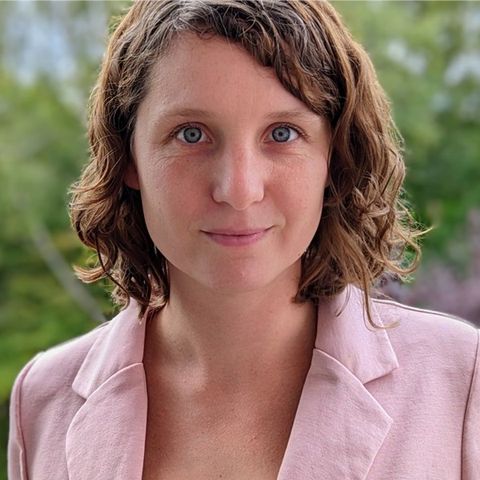
1st prize
Fraunhofer MEVIS – Alessa Hering
The jury writes: “First place in the Fraunhofer ICT Dissertation Award 2024 goes to Alessa Hering from Fraunhofer MEVIS for her excellent dissertation Deep-Learning-based Image Registration and Tumor Follow-Up Analysis.
Ms. Hering has not only developed new approaches for precise image registration and tumor response prediction, but has also established herself as an integral part of the scientific community. Through her close collaboration with international research teams and her contributions to high-impact publications, she has significantly expanded the boundaries of her field and opened up new avenues for medical image processing. Her contributions have been recognized with a number of awards and honors.
We congratulate Ms. Hering on this outstanding achievement and thank her for her significant contribution to scientific excellence!”
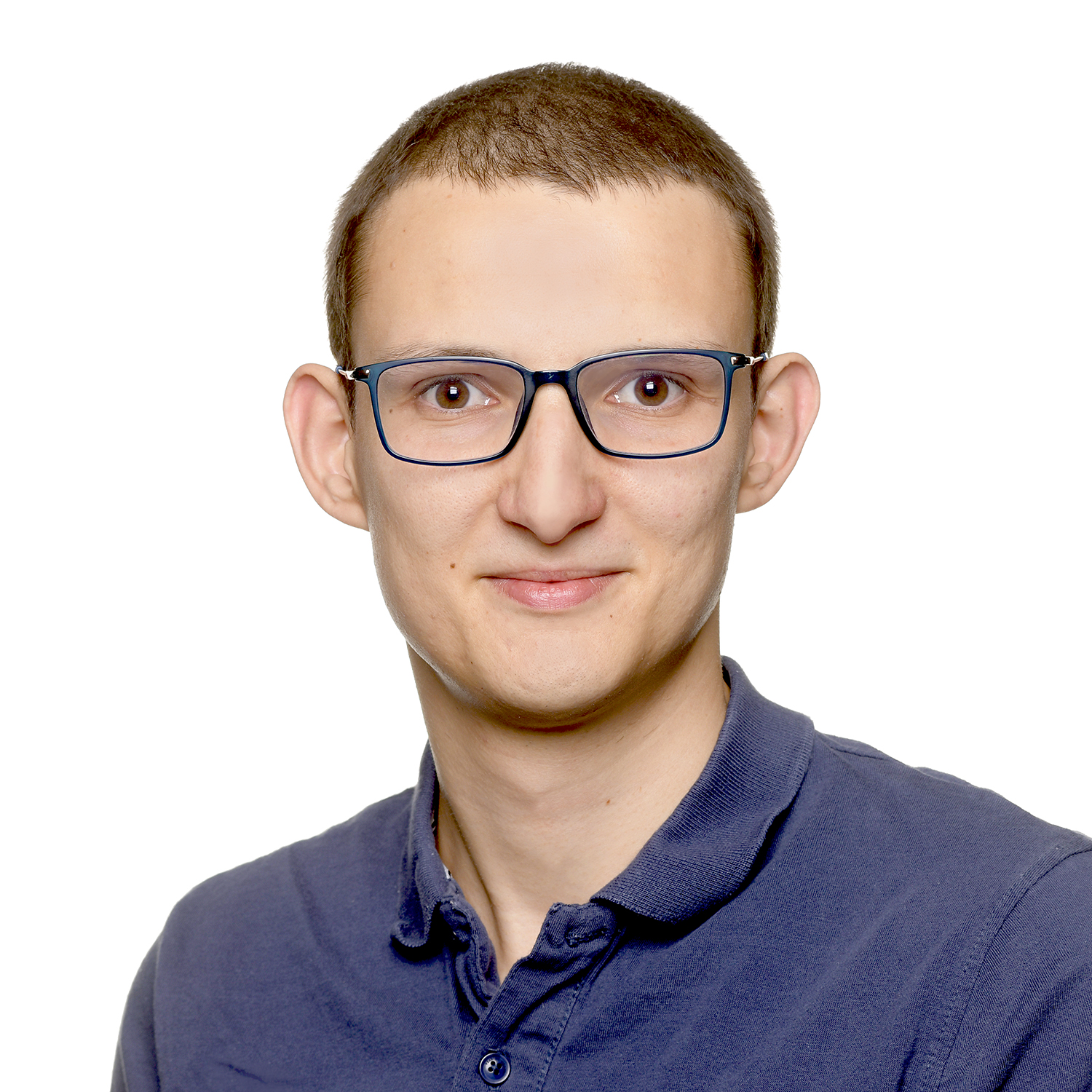
2nd prize
Fraunhofer ITWM – Tin Barisin
The jury commented on his work as follows: “Second place in the Fraunhofer ICT Dissertation Award 2024 goes to Tin Barisin from the Fraunhofer Institute for Industrial Mathematics ITWM for his outstanding dissertation entitled: Methods for scale and orientation invariant feature analysis in image data.
With innovative approaches such as the novel RieszNet, Mr. Barisin has made significant advances in image processing, particularly for the analysis of cracks in 3D image data of concrete structures. His work combines mathematical excellence with practical relevance and has already been implemented in software solutions at Fraunhofer ITWM. His exceptional commitment and strong scientific network make him an asset to the research community.
We congratulate Mr. Barisin on this impressive achievement and wish him continued success in his scientific career!”
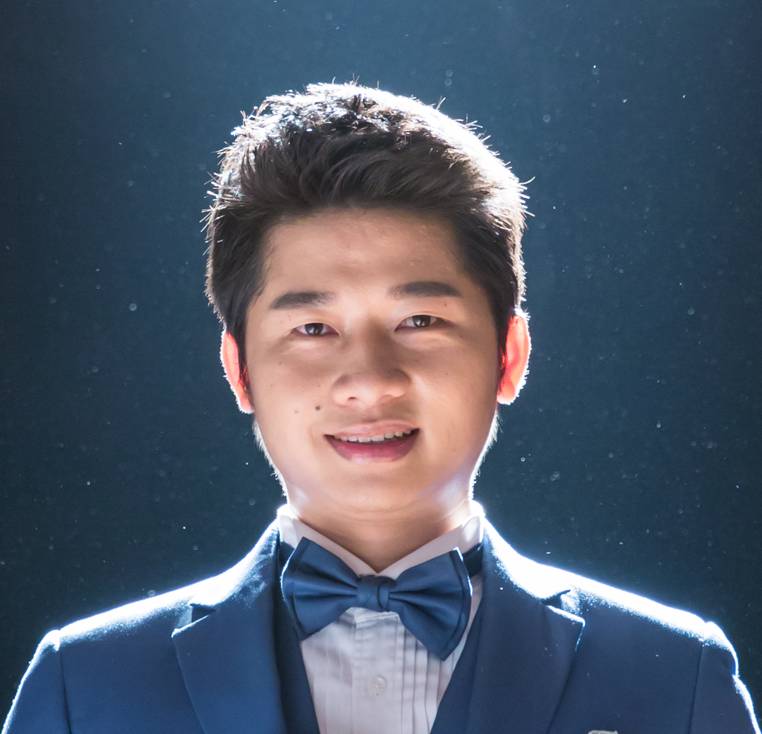
3rd prize
Fraunhofer IGD – Danwu Chen
His work was recognized by the jury as follows: “Third place in the Fraunhofer ICT Dissertation Award 2024 goes to Danwu Chen from the Fraunhofer Institute for Computer Graphics Research IGD for his dissertation: Deep learning for characterizing full-color 3D printing processes.
With his work, Mr. Chen has made a significant contribution to the further development of 3D printing. His innovative approaches in the field of deep learning enable more precise characterization of full-color 3D printing processes and open up new possibilities for optimizing material usage and print quality. His models achieve significantly higher accuracy, physically plausible predictions, and reduce the data requirements for printer characterization considerably – which is also reflected in several patent applications.
We congratulate Mr. Chen on this outstanding achievement and thank him for his contribution to the future of additive manufacturing!”
2023 award winners
The award-winning dissertations in 2023 center around the topic of "machine learning", which is being investigated from various directions and application domains. The winners come from the Fraunhofer Institutes for Applied Information Technology FIT, for Applied and Integrated Security AISEC and for Digital Media Technology IDMT.
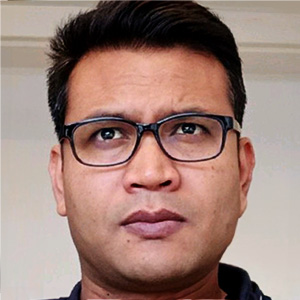
1st prize
Fraunhofer FIT – Rezaul Karim
His work "Interpreting Black-Box Machine Learning Models with Decision Rules and Knowledge Graph Reasoning" aims to improve the interpretability and explainability of non-transparent machine learning models without significantly compromising prediction accuracy. To this end, various representation learning techniques are used to transform multimodal data into a common latent space. Interpretable methods are then applied to generate decision rules and negative factors that explain how the model works. Robustness against attacks and the integration of symbolic logic are also considered. Quantitative evaluation has shown that the approach achieves higher performance compared to existing methods.
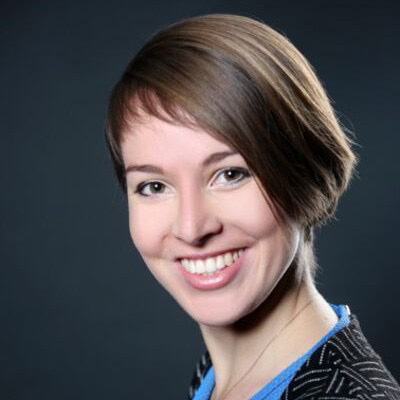
2nd prize
Fraunhofer AISEC – Franziska Boenisch
The thesis "Secure and Private Machine Learning" examines security and privacy aspects in the field of machine learning (ML). It is shown that ML practitioners have a low awareness of data protection and rely on third-party frameworks and services. New attack vectors and security vulnerabilities are highlighted and the need for secure and privacy-compliant design of ML methods is emphasized.
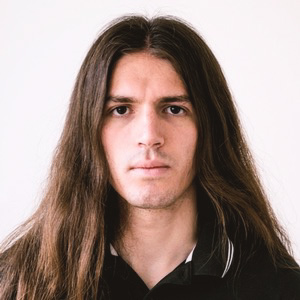
3rd prize
Fraunhofer IDMT – Stylianos Ioannis Mimilakis
The thesis "Deep Learning-Based Music Source Separation" investigates the problem of music source separation using deep learning methods. Three aspects are considered: signal processing, neural architecture and signal representation. New algorithms and network architectures are presented that show that deep neural networks can learn data-driven filters for music source separation. The proposed methods have achieved promising results in music source separation.
2022 award winners
The 2023 award winners come from the institutes Fraunhofer IGD, Fraunhofer ITWM and Fraunhofer SIT. In our interview they explain which topics their work deals with and why they are so interesting on the one hand, but at the same time so important for our future.

Privacy warning
With the click on the play button an external video from www.youtube.com is loaded and started. Your data is possible transferred and stored to third party. Do not start the video if you disagree. Find more about the youtube privacy statement under the following link: https://policies.google.com/privacy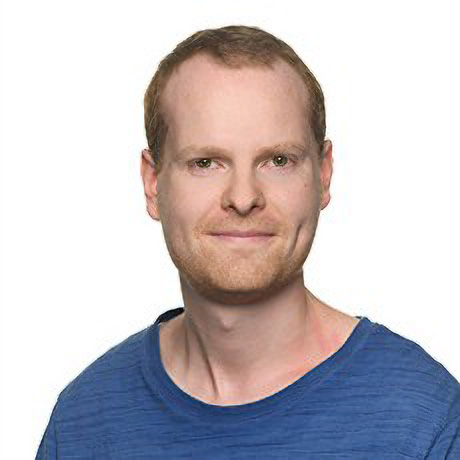
1st prize
Fraunhofer ITWM – Sebastian Blauth
Dr. Sebastian Blauth of the Fraunhofer Institute for Industrial Mathematics ITWM won the award for his paper titled "Adjoint-Based Shape Optimization and Optimal Control with Applications to Microchannel Systems."
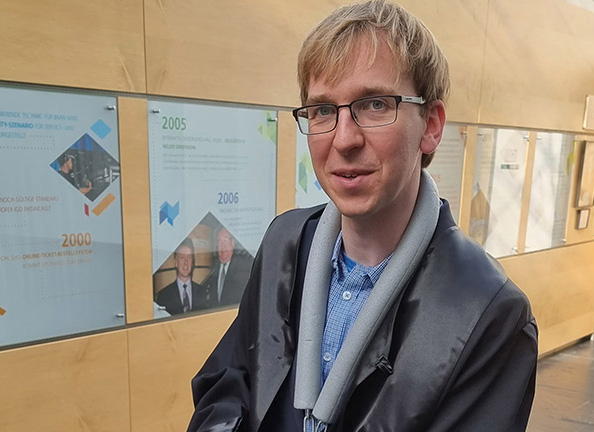
2nd Prize
Fraunhofer IGD – Philipp Terhörst
Dr.-Ing. Philipp Terhörst from the Fraunhofer Institute for Computer Graphics Research IGD was awarded second place for his work. His dissertation is entitled "Mitigating Soft-Biometric Driven Bias and Privacy Concerns in Face Recognition Systems".
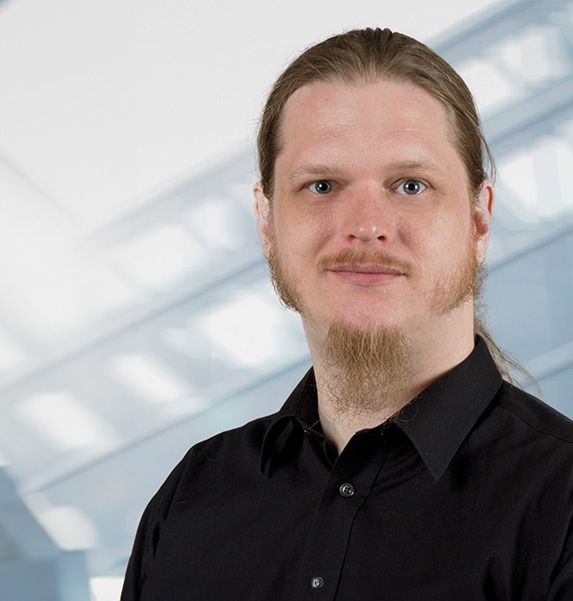
3rd Prize
Fraunhofer SIT – Andreas Fuchs
The third prize went to Dr.-Ing. Andreas Fuchs from the Fraunhofer Institute for Secure Information Technology SIT and his work on "Engineering Trustworthy Systems by Minimizing and Strengthening their TCBs using Trusted Computing".
2021 award winner
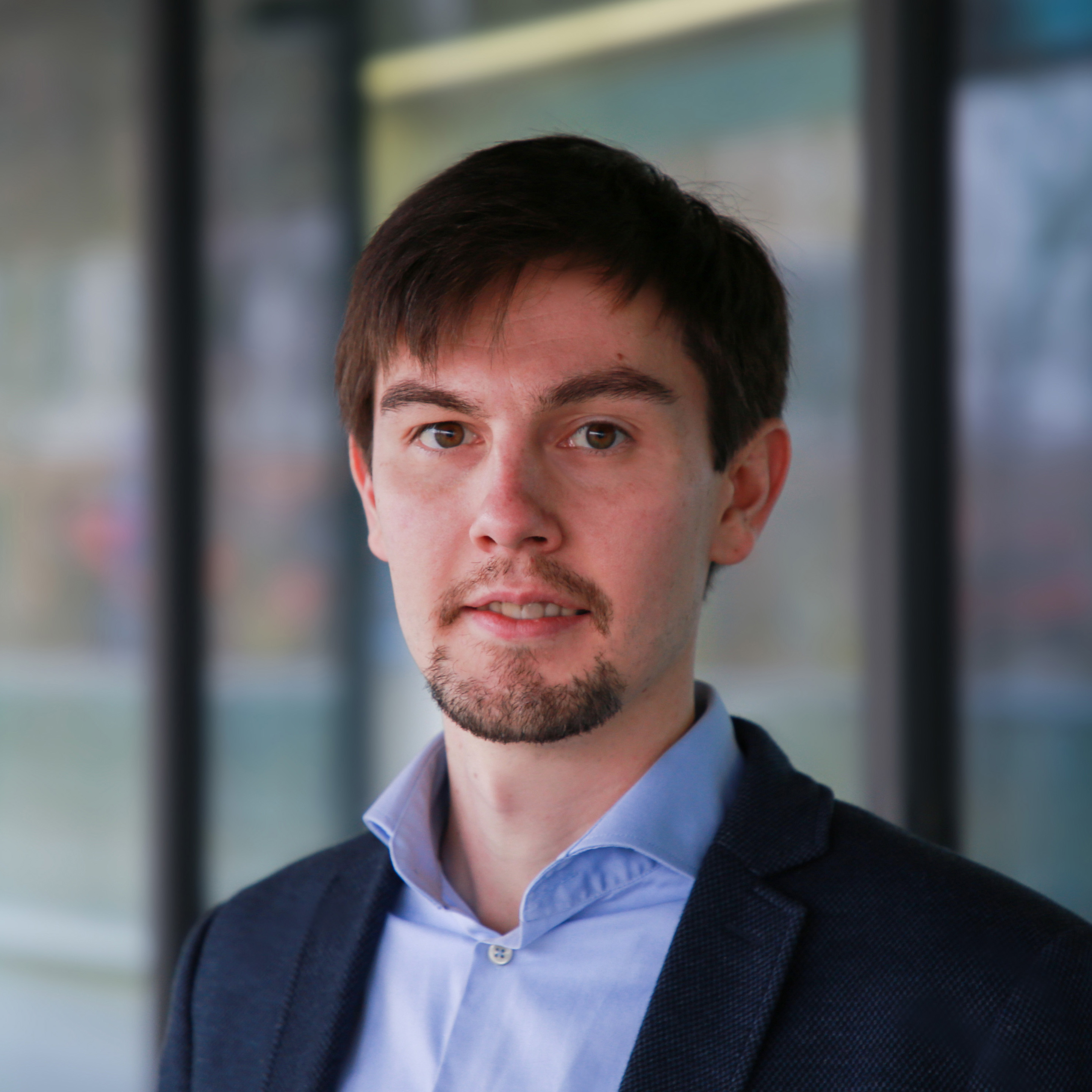
1st Prize
Fraunhofer IEM – Johannes Späth
This year's ICT Dissertation Award went to Johannes Späth from the Fraunhofer Institute for Mechatronics Design IEM, who passed his doctoral exam with the highest grade "summa cum laude". He completed his doctorate at the University of Paderborn on the topic of "Synchronized Pushdown Systems for Pointer and Data-Flow Analysis" under Prof. Eric Bodden.
His dissertation involves the development of efficient and accurate data-flow analysis algorithms. The algorithms help software developers to detect errors in their program code early, during compilation. The algorithms achieve efficiency through "on demand" analysis; instead of analyzing the entire software, only relevant parts of the software code are analyzed. Thus, results are delivered within seconds, instead of hours as with existing analysis algorithms. At the same time, the algorithms are highly precise with an extremely low false positive rate.
2020 award winners
The 2020 award winners, Julius Pfrommer from the Fraunhofer Institute of Optronics, System Technologies and Image Exploitation IOSB, André Homeyer from the Fraunhofer Institute for Digital Medicine MEVIS and Konstantin Böttinger from the Fraunhofer Institute for Applied and Integrated Security AISEC, were able to impress the jury with their work not only by achieving remarkable results, but also by enriching developments in highly topical research areas.
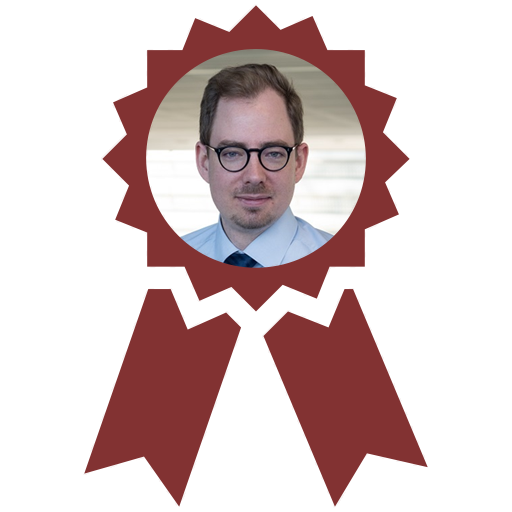
1st Prize
Fraunhofer IOSB – Julius Pfrommer
»Distributed Planning for Self-Organizing Production Systems«
The work describes an automatic adaptation of the control of production plants to changing orders and framework conditions. The principle of self-organization through distributed planning is applied.
The evaluation of the thesis with the rating "with distinction", the numerous publications of the author and the high citation rates (h-index: 13) underline the high scientific level of the work. At the same time, the work is of very high practical relevance for the manufacturing industry and thus has a strong economic and thus also social impact.
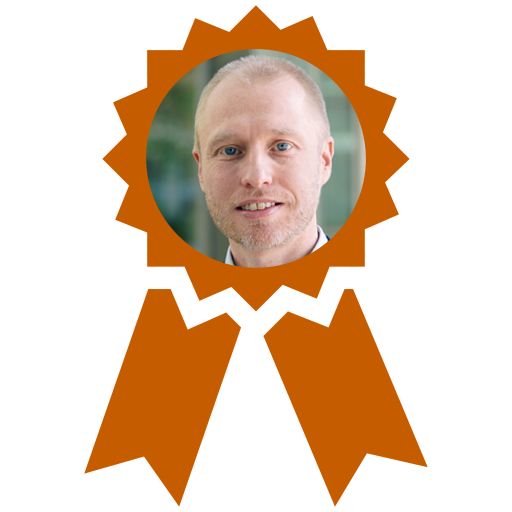
2nd Prize
Fraunhofer MEVIS – André Homeyer
»Automated analysis of necrosis and steatosis in histological images – Practical solutions for coping with heterogeneity and variability«
The dissertation makes important contributions to the improvement of automated histological image analysis with a focus on the quantification of necrosis or the quantification of steatosis in histological sections of liver tissue. Newly developed scores enable reliable measurement of heterogeneously distributed tissue properties. Interactive training leads to reduced effort while still providing accurate results. Finally, methods are presented that enable accurate yet rapid automated analysis of even large image data sets.
Due to the thematic focus, the work has a very high societal relevance and also exhibits a high degree of interdisciplinarity, innovation as well as transferability and generalizability.

3rd Prize
Fraunhofer AISEC – Konstantin Böttinger
»Fuzzing with Stochastic Feedback Processes«
In the context of the thesis, new AI-supported testing methods are presented to support modern software development processes and thus to improve the security of software. For this purpose, results from probability theory are translated into algorithms for testing software.
The work provides relevant new methods to secure complex software systems against cyber attacks. This aspect will become immensely important in view of the advancing digitalization and networking and the increasing importance of software in the industrial, governmental and private sectors. Since potentially vulnerable software is used to control critical infrastructures, industrial plants, production processes, medical devices and automated driving vehicles, practical approaches to solutions for increasing software and IT security have an enormous economic and social impact. In view of the fundamental and still increasing importance of IUK technologies for society, high attention should be paid to cognitive security.
2019 award winners
A unique twist characterizes the awarding of prizes in 2019: For the first time, two first prizes and one third prize were awarded.
The first prize is shared by Dr. Anna-Marie Kruspe from the Fraunhofer Institute for Digital Media Technology IDMT in Ilmenau and Dr. Erion Elmasllari from the Fraunhofer Institute for Applied Information Technology FIT in Sankt Augustin.
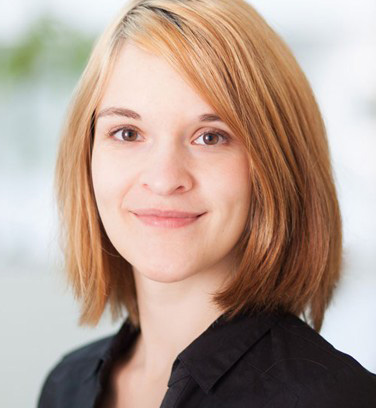
1st Prize
Fraunhofer IDMT – Anna-Marie Kruspe
Anna-Marie Kruspe was awarded for her work "Application of Automatic Speech Recognition Technologies to Singing". The field of Music Information Retrieval deals with the automatic analysis of musical characteristics. One aspect that has hardly been explored so far is the sung lyrics. In automatic speech recognition, many methods are developed for the automatic analysis of speech, but rarely for singing. The work of Anna-Marie Kruspe investigates the application of methods from speech recognition to singing and describes ways to apply and improve automatic speech recognition techniques to various singing-related search tasks, including phoneme recognition, speech recognition, keyword search, text-to-song matching, and song text search. To this end, she pursued two general approaches: First, she works on better phoneme recognition models, which she identified as a general bottleneck in almost all of the above retrieval tasks, and trains them with enhanced speech recordings presented in a more "song-like" manner, or with real song recordings with automatically matched lyrics. Second, she adapts automatic speech recognition techniques to song, incorporating domain knowledge and adapting them to the various properties of this data.
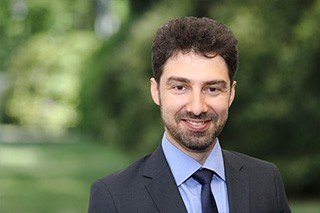
1st Prize
Fraunhofer FIT – Erion Elmasllari
Erion Elmasllari's dissertation, "A Framework for the Successful Design and Deployment of Electronic Triage Systems," was convincing. Triage is the process by which emergency responders, especially in high patient volume situations, determine the order and priority for medical assistance. After assessing the severity of injuries, first responders tag victims to indicate a priority for treatment. At the end of the triage process, victims are treated according to the assigned priority.
Erion Elmasllari's work identifies the key factors that determine the acceptance of e-triage systems and uses them as the basis for a framework for designing such systems. The framework can be used evaluatively to communicate the reasons why previous e-Triage systems have failed, but can also be used generatively to actively assist system designers in designing acceptable e-Triage systems. In either case, the framework illuminates the needs, limitations, risks, and issues of e-Triage systems within the overarching triage ecosystem.
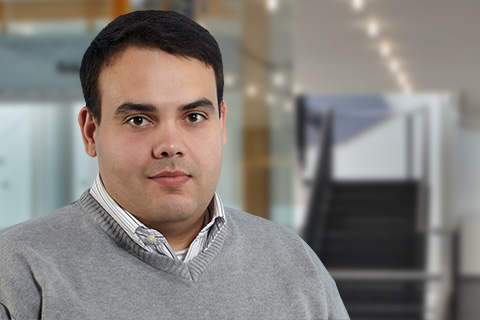
3rd Prize
Fraunhofer IGD – Naser Damer
The third prize was awarded to Dr. Naser Damer from the Fraunhofer Institute for Computer Graphics Research IGD in Darmstadt for the doctoral thesis entitled "Application-driven Advances in Multi-biometric Fusion". Biometrics is the automated recognition of individuals based on their behavior or biological characteristics. Typical applications include fingerprint or facial image recognition to gain access to IT systems or entry to rooms. The major advantage of biometrics is that the user does not have to remember a password or carry a key. To create the most secure system possible, numerous approaches have been proposed that seek a balance between, for example, security, accuracy, and ease of use. One relatively new and promising approach is multibiometric fusion. Here, multiple biometric features are used to identify a particular user. Naser Damer's work focuses on such multibiometric fusion systems with the goal of improving overall performance and functionality. By optimizing the fusion process, his approaches achieve higher biometric accuracy through the use of additional information. He also presents specific applications that complement biometric systems and use multibiometric fusion to improve performance.
2018 award winners
Once again this year, the Fraunhofer Institute for Secure Information Technology SIT can claim first place in the Fraunhofer ICT Dissertation Awards.
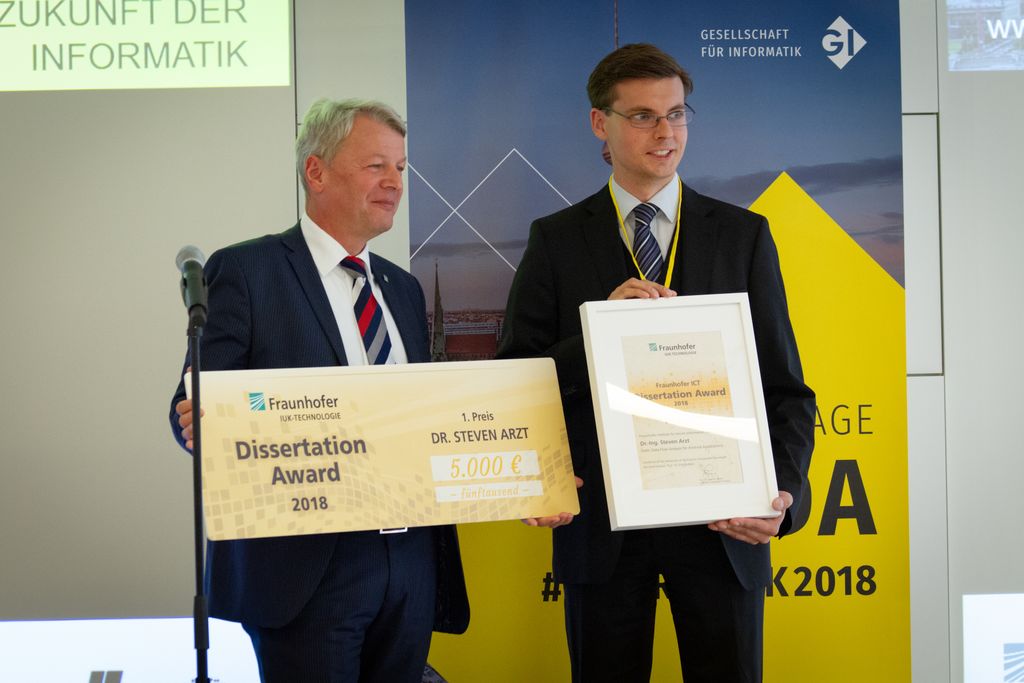
1st Prize
Fraunhofer SIT – Steven Arzt
Dr. Steven Arzt's work on "Static Data Flow Analysis for Android Applications" was convincing across the board. In it, he presents the FlowDroid tool, which extracts precise and largely complete data flows from popular apps such as Facebook, PayPal and LinkedIn. FlowDroid's result reports improve the user's digital sovereignty, as they can now see for themselves how an app handles their data before installing the app on their device and thus entrusting it with their data. With FlowDroid, the user can understand what data is collected from his device and sent to third parties.
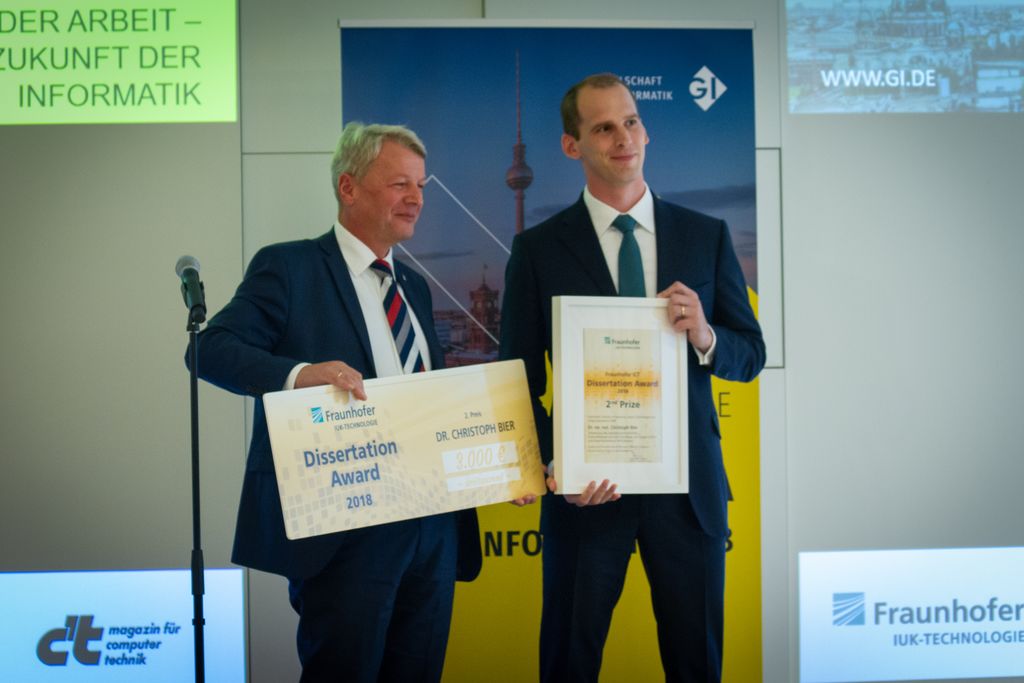
2nd Prize
Fraunhofer IOSB – Philipp Christoph Sebastian Bier
In his work "Implementation of the Right to Information under Data Protection Law on the Basis of Usage Control and Data Provenance Technologies," Dr. Philipp Christoph Sebastian Bier subjects the right to information in data protection law to a critical appraisal and creates comprehensive technical requirements for exercising this right to information. He designs and implements a distributed, data-centric, integrated and data subject-focused data protection information system with which the right to information can be exercised interactively and step-by-step. On the one hand, this requires in-depth legal preparation of the problem and, on the other, equally in-depth IT penetration. This is the only way to arrive at a solution that is both scientifically and technically state of the art, but at the same time meets the highest legal requirements. Dr. Bier has succeeded very well in finding such a solution. This work from the Fraunhofer Institute of Optronics, System Technologies and Image Exploitation IOSB was worth the second prize to the jury.
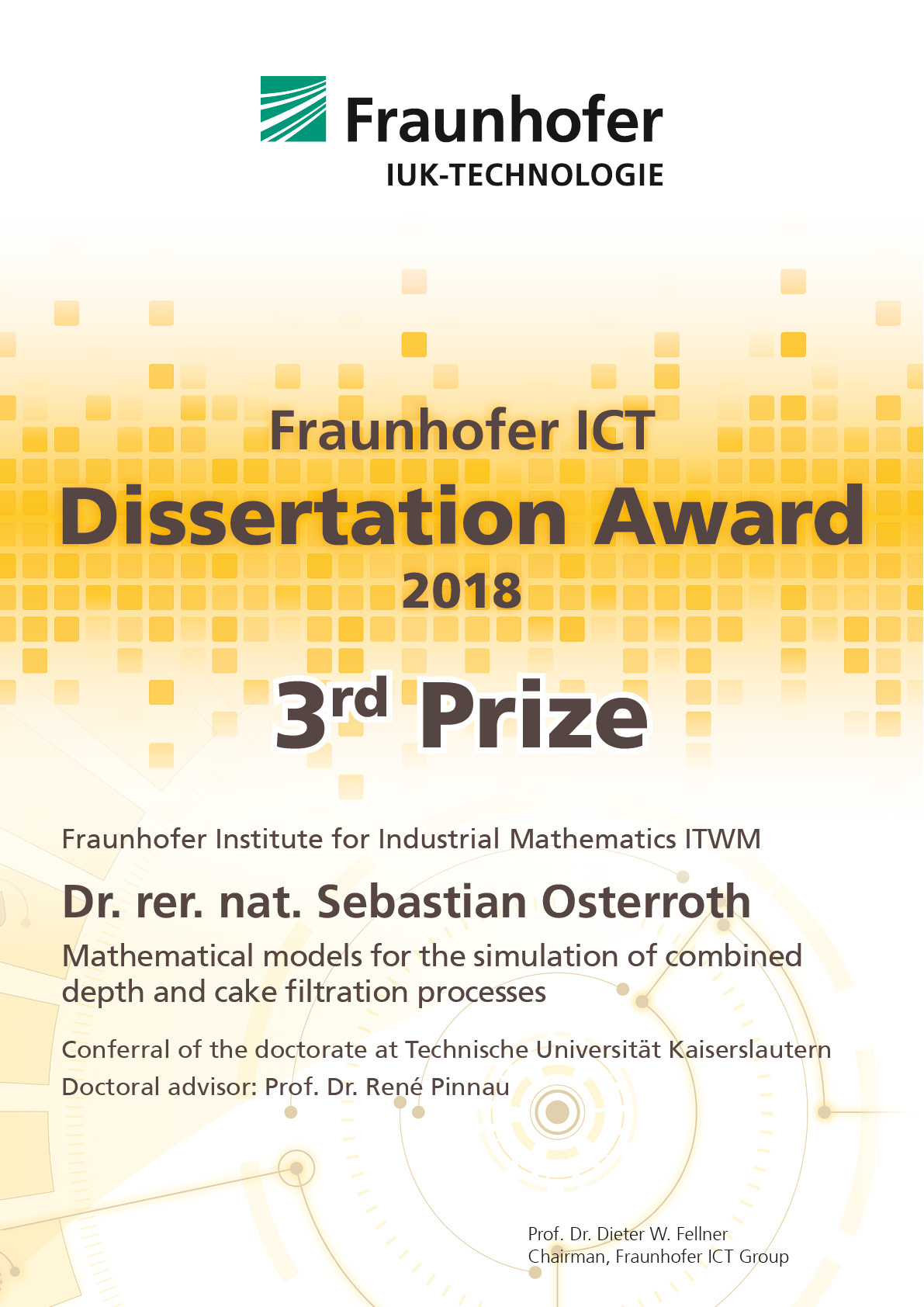
3rd Prize
Fraunhofer ITWM – Sebastian Osterroth
This year's third prize went to the Fraunhofer Institute for Industrial Mathematics ITWM with the work of Dr. Sebastian Osterroth on "Mathematical models for the simulation of combined depth and cake filtration processes". In this paper, Dr. Osterroth describes the modeling of filtration processes. In this process, solids of different particle sizes accumulate from the substance flowing through the filter, which on the one hand improve the filtration process, but on the other hand increase the flow resistance. The resulting pressure drop essentially determines the energy required for the filtration process. In the dissertation, a combination of deep-bed filtration and cake filtration is considered. In deep-bed filtration, the separation of particles occurs in the flowed filter medium. Particle separation is achieved solely by the filter membrane placed in the flow. In cake filtration, on the other hand, it is desired that filtration be improved by the filter cake that forms as a result of deposition. Dr. Osterroth developed a new mathematical model for the coupled process consisting of a nonlinear system of partial and ordinary differential equations.
2017 award winners
On the evening of September 26, 2017, this year's Fraunhofer ICT Dissertation Award winners were selected in Chemnitz. The award ceremony traditionally took place during the annual conference of the Gesellschaft für Informatik.
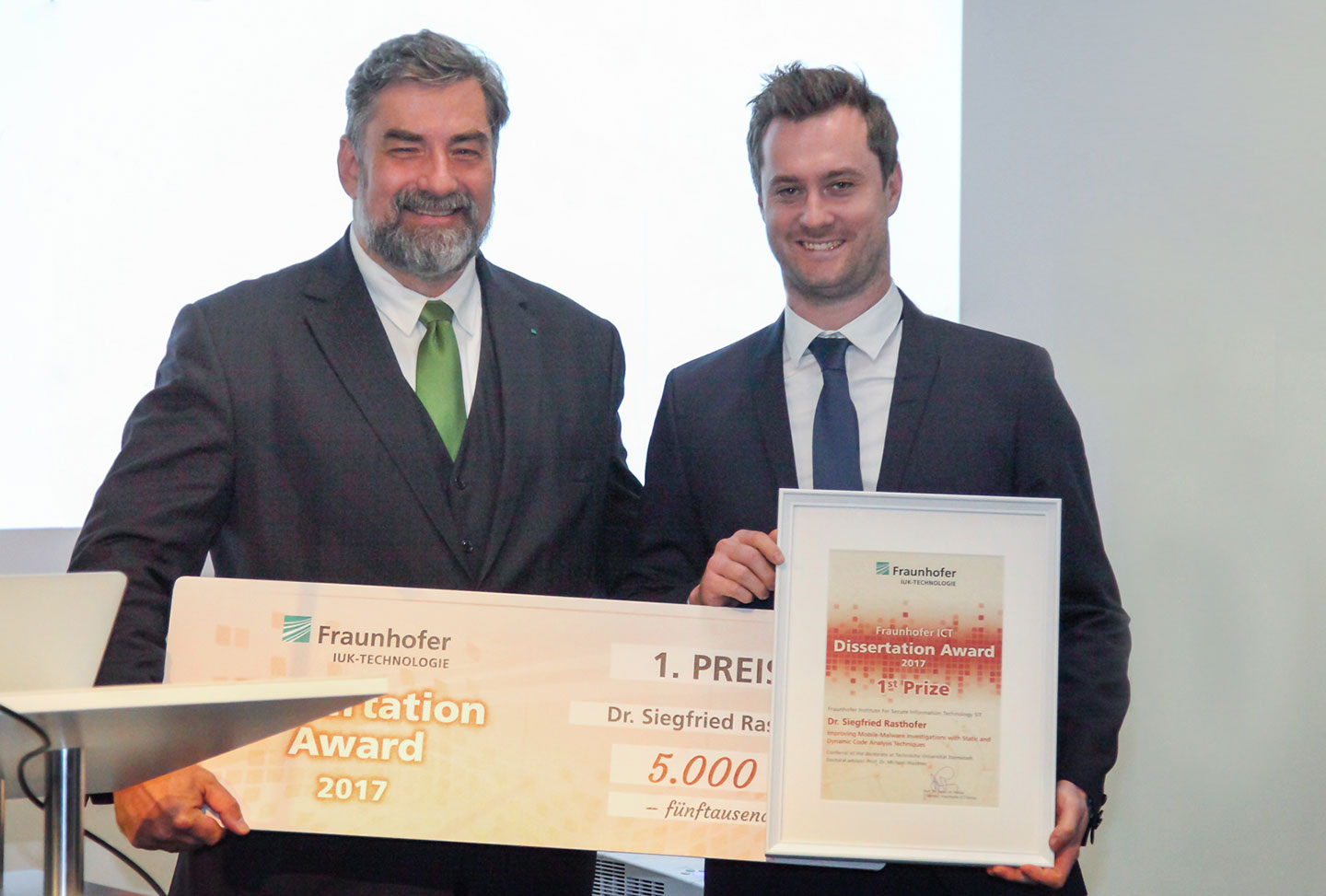
1st Prize
Fraunhofer SIT – Siegfried Rasthofer
In the third edition of the award, which is endowed with a total of EUR 10,000, Dr. Siegfried Rasthofer from Fraunhofer SIT in Darmstadt won first prize with his work "Improving Mobile-Malware Investigations with Static and Dynamic Code Analysis Techniques".
In his work, he developed an approach to analyze Android software for malicious content. In particular, this solution can be used to check third-party apps for malicious content, even when no source code is available. Malicious code can be detected even when developers attempt to bypass this detection. The results of the dissertation have given rise to the product "CodeInspect" at Fraunhofer SIT, which has been licensed by various manufacturers for malicious code detection.
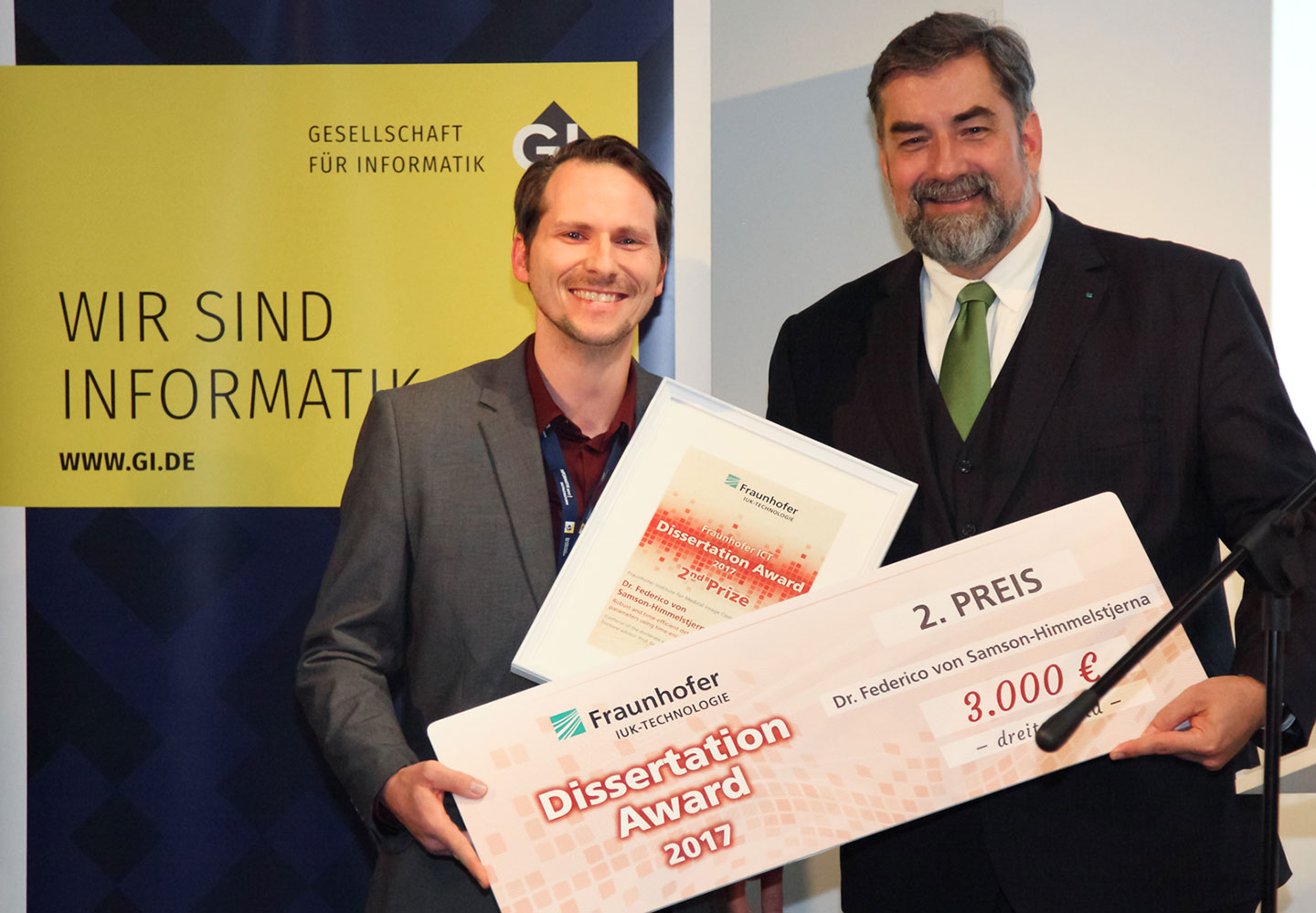
2nd Prize
Fraunhofer MEVIS – Federico von Samson-Himmelstjerna
The second prize was awarded to Dr. Federico von Samson-Himmelstjerna for his work "Robust and time-efficient determination of perfusion parameters using time-encoded arterial spin labeling MRI", which he wrote at Fraunhofer MEVIS in Bremen. Behind this is a medical procedure for measuring blood flow using magnetic resonance imaging. The special feature here is that the patient does not have to be administered a contrast medium for this measurement. The procedure can be used to efficiently support the diagnosis and monitoring of diseases such as stroke, multiple sclerosis, Alzheimer's, Parkinson's or cancer of the brain.
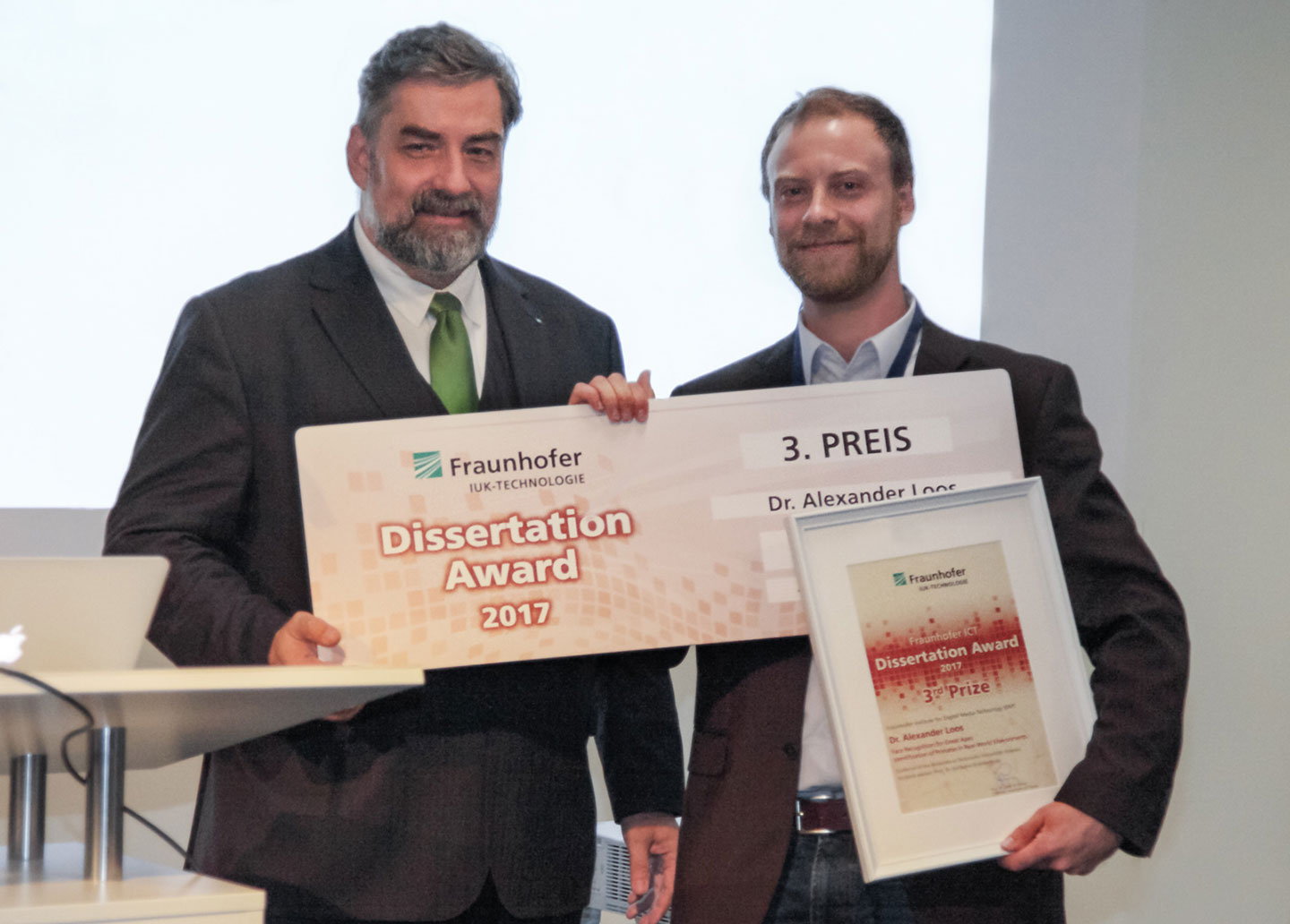
3rd Prize
Fraunhofer IDMT – Alexander Loos
Dr. Alexander Loos from Fraunhofer IDMT in Ilmenau dealt with a not quite everyday application of image analysis and face recognition technologies in his doctoral thesis "Face Recognition for Great Apes: Identification of Primates in Real-World Environments", for which he received the third prize of the Fraunhofer ICT Dissertation Award. His method represents the world's first real-time capable system for the individual recognition of great apes in images and videos, which also works reliably under difficult open-field conditions. It is used in wildlife research to evaluate conservation measures for the great apes, which are threatened with extinction. The method is equally suitable for use in zoos and wildlife parks to provide visitors with a more interactive experience.
2016 award winners
The ICT Dissertation Awards were presented for the second time on September 28, 2016 as part of the Computer Science Day of the German Informatics Society in Klagenfurt. The winning PhD students of this year's award came from the institutes Fraunhofer ITWM, Fraunhofer IGD and Fraunhofer FIT.
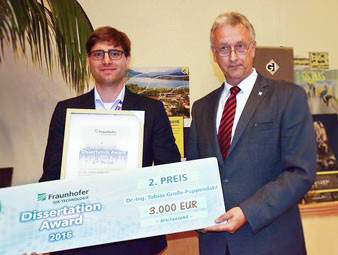
2nd Prize
Fraunhofer IGD – Tobias Große-Puppendahl
Dr.-Ing. Tobias Große-Puppendahl received the 2nd prize with his work "Capacitive Sensing and Communication for Ubiquitous Interaction and Environmental Perception", TU Darmstadt, submitted by Prof. Dr. Dieter W. Fellner from Fraunhofer IGD.
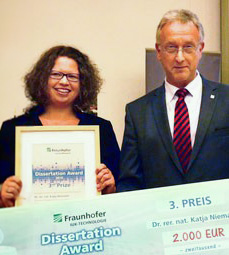
3rd Prize
Fraunhofer FIT – Katja Niemann
The third prize went to Dr. rer. nat. Katja Niemann for the paper "Discovery of Usage-based Item Similarities to Support Recommender Systems in Dealing with Rarely Used Items", RWTH Aachen, submitted by Prof. Dr. Matthias Jarke from Fraunhofer FIT.
2015 award winner
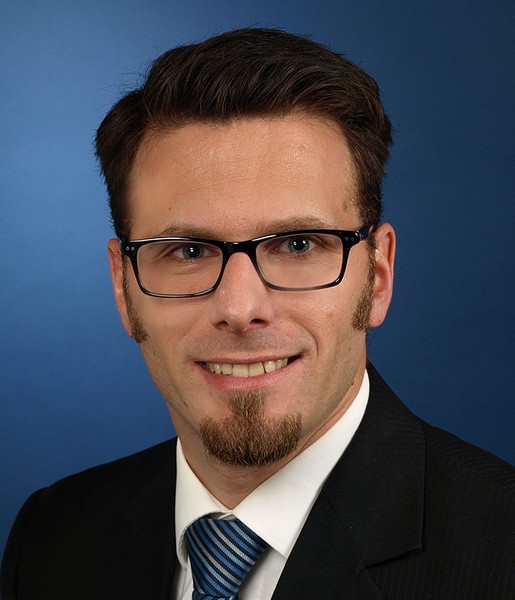
1st Prize
Fraunhofer MEVIS – Christian Rieder
Dr. Christian Rieder was awarded the inaugural "Fraunhofer ICT Dissertation Award" for his doctoral thesis "Interactive Visualization for Assistance of Needle-Based Interventions". The award was presented on September 30, 2015 during the 45th annual conference of the Gesellschaft für Informatik in Cottbus.
The award-winning work deals with a highly innovative visualization methodology that makes it easier to plan minimally invasive interventions for the treatment of tumors and to determine the success of the therapy more objectively.


